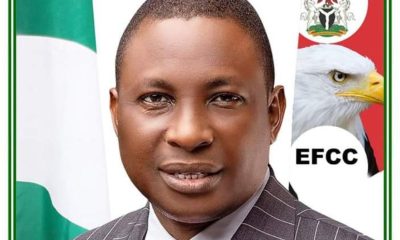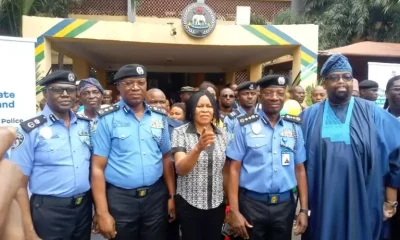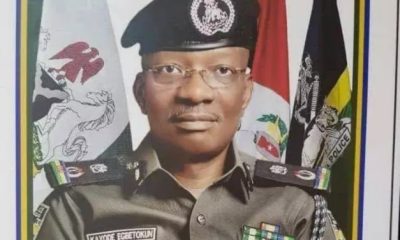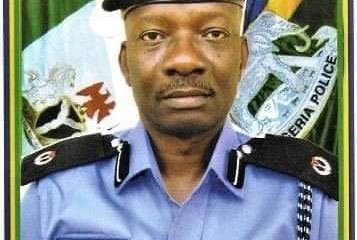Headline
I Will Make Community Policing Work, New IGP Egbetokun Vows
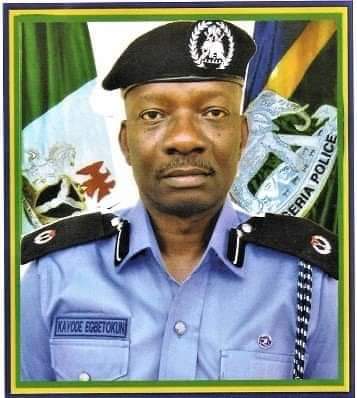
Newly appointed Inspector General of Police (IGP), Kayode Egbetokun has vowed to make community policing work as he assumed office at the Force Headquarters in Abuja.
He stated this on Wednesday when he officially took over the leadership of the Nigeria Police Force from retired IGP Usman Baba.
IGP Egbetokun warned police officers that he won’t tolerate abuse of office, corruption and misconduct, saying commensurate stiff punishment await erring officers.
The new police boss also said he will, in the coming days and months, unveil his strategies and tactics to secure the country and protect Nigerians from all forms of security challenges including banditry and gunmen attacks.
IGP Egbetokun said the salaries of constables recruited sometimes ago are already being looked into and the salaries, arrears and allowances will be paid by month end.
According to him, every law-abiding citizen will be brought on board in the fight against crime under his watch. The new police chief stressed that human intelligence garnered from communities would be used alongside technical gathering of information to curb crimes.
“Apart from technical intelligence, we are also going to rely so much on human intelligence available in our communities. We are going to be proactive in our approach to solving our community problems,” he said.
Quest For Community Policing
As banditry, vicious herdsmen attacks, killings and abductions increase in Nigeria in the last couple of years, some state government and socio-political groups like the Afenifere and the Ohanaeze Ndigbo had clamoured for community policing to tackle peculiar security challenges in the localities. Prior to the 2023 elections, the groups also called for constitutional review to allow devolution of powers and decentralised policing system.
In 2020, six states in the South-West geopolitical zone jointly formed a regional security operation code-named Operation Amotekun, which has since been backed by law and operational in Oyo, Ondo, Ekiti, Ogun and Osun states. Also, in 2021, five South-East state governments formed Ebube Agu and the regional security outfit has since been operationalised just as the Benue State Government in 2022 launched the Benue Guards.
However, lack of arms licence for the men of these state-owned security have been said to hamper their effectiveness even as calls grow for the police to let them bear assault rifles like AK-47.
As part of its efforts to make community policing work, the administration of then President Muhammadu Buhari in August 2020 approved the sum of N13.3bn for the take-off of community policing initiative across the country but some challenges have encumbered the implementation of the initiative.
‘Challenges Will Be Addressed’
Acknowledging the challenges in the implementation of the initiative, the new IGP said they would be resolved and community policing is going to work.
IGP Egbetokun said, “On community policing, there is a lot that we are going to do differently in the implementation of the community policing strategies that we are operating presently.
“I discussed that with the retiring IG, my predecessor just before we came here and he told me all the problems we are facing with the implementation of the community policing strategies. We are not going to set it aside, we are going to continue with it but we are going to review a lot of things. We are going to make it work.”
Headline
EFCC bars dollar transactions, orders embassies to charge in naira

The Economic and Financial Crimes Commission has barred foreign missions based in Nigeria from transacting in foreign currencies and mandated them to use Naira in their financial businesses.
The EFCC has also mandated Nigerian foreign missions domiciled abroad to accept Naira in their financial businesses.
The anti-graft agency said the move is to tackle the dollarisation of the Nigerian economy and the degradation of the naira
The Commission, therefore, asked the government to stop foreign missions in Nigeria from charging visa and other consular services in foreign denominations.
The EFCC gave the advisory in a letter to the Minister of Foreign Affairs, Amb. Yusuf Tuggar, for onward transmission to all foreign missions in the country.
In the letter, the EFCC said it issued the advisory because the practice of paying for consular services in dollars was in conflict with extant laws and financial regulations in Nigeria.
In a letter dated April 5, 2024, which was addressed to the Minister of Foreign Affairs, Ambassador Yusuf Tuggar, titled: “EFCC Advisory to Foreign Missions against Invoicing in US Dollar,” the EFCC Chairman, Ola Olukoyede expressed dismay over the invoicing of consular services in Nigeria by foreign missions in dollars.
The EFCC cited Section 20(1) of the Central Bank of Nigeria Act, 2007, which makes currencies issued by the apex bank the only legal tender in Nigeria.
The letter read, “I present to you the compliments of the Economic and Financial Crimes Commission, and wish to notify you about the commission’s observation, with dismay, regarding the unhealthy practice by some foreign missions to invoice consular services to Nigerians and other foreign nationals in the country in United States dollar ($).
“It states that ‘the currency notes issued by the Bank shall be the legal tender in Nigeria on their face value for the payment of any amount’.
“This presupposes that any transaction in currencies other than the naira anywhere in Nigeria contravenes the law and is, therefore, illegal.”
The commission further stated that the rejection of the naira for consular services in Nigeria by certain missions, along with non-compliance with foreign exchange regulations in determining service costs, is not just unlawful but also undermines the nation’s sovereignty embodied in its official currency.
The letter continues: “This trend can no longer be tolerated, especially in a volatile economic environment where the country’s macroeconomic policies are constantly under attack by all manner of state and non-state actors.
“In light of the above, you may wish to convey the commission’s displeasure to all missions in Nigeria and restate Nigeria’s desire for their operations not to conflict with extant laws and regulations in the country.”
Diplomatic sources said yesterday, May 10, that some embassies were wondering whether the EFCC’s advisory represented the position of the Federal Government.
Headline
Prince Harry visits sick Nigerian soldiers in Kaduna

Prince Harry and his team visited the 44 Nigerian Army Reference Hospital in Kaduna to interact with wounded soldiers who are receiving treatment.
The Duke of Sussex is in Nigeria with his wife to champion the Invictus Games, which Harry founded to aid the rehabilitation of wounded and sick servicemembers and veterans.
Nigeria joined the Invictus Community of Nations in 2022 becoming the first African country to join.
Prince Harry’s visit to Kaduna came 68 years after his late grandmother Queen Elizabeth II visited the state during the time of the late Premier of Northern Region Sir Ahmadu Bello.




-

 Headline2 days ago
Headline2 days agoSuspend cybersecurity levy– Reps to CBN
-

 Entertainment2 hours ago
Entertainment2 hours agoAMVCA Cultural Day: BBNaija’s Neo, Venita win Best Dressed Male, Female
-

 Metro2 hours ago
Metro2 hours agoEx-Sports Minister laments after hospital neglected him for hours over N80000 deposit
-

 Headline2 hours ago
Headline2 hours agoPrince Harry visits sick Nigerian soldiers in Kaduna
-

 Headline2 days ago
Headline2 days agoTinubu resumes work after foreign trip
-

 Business2 days ago
Business2 days agoNigeria needs over $2bn to revive Ajaokuta Steel Plant, says Minister
-

 News2 days ago
News2 days agoShan George’s money returned to Zenith Bank account

